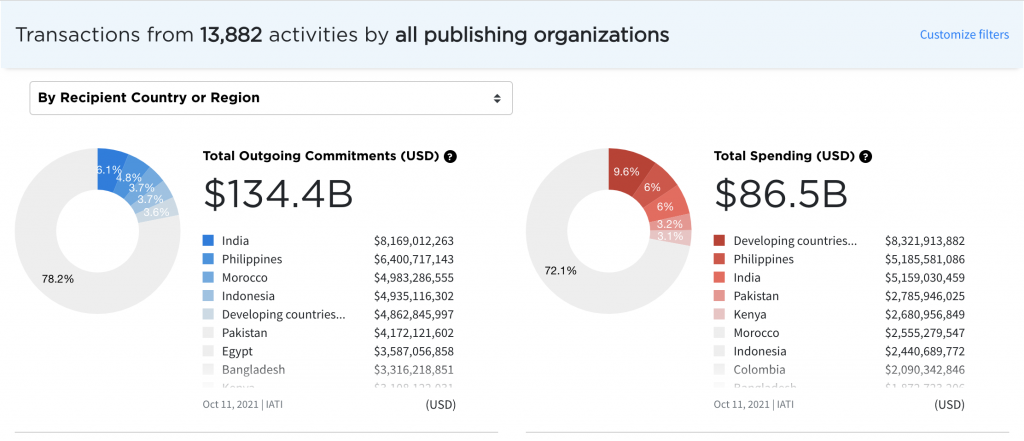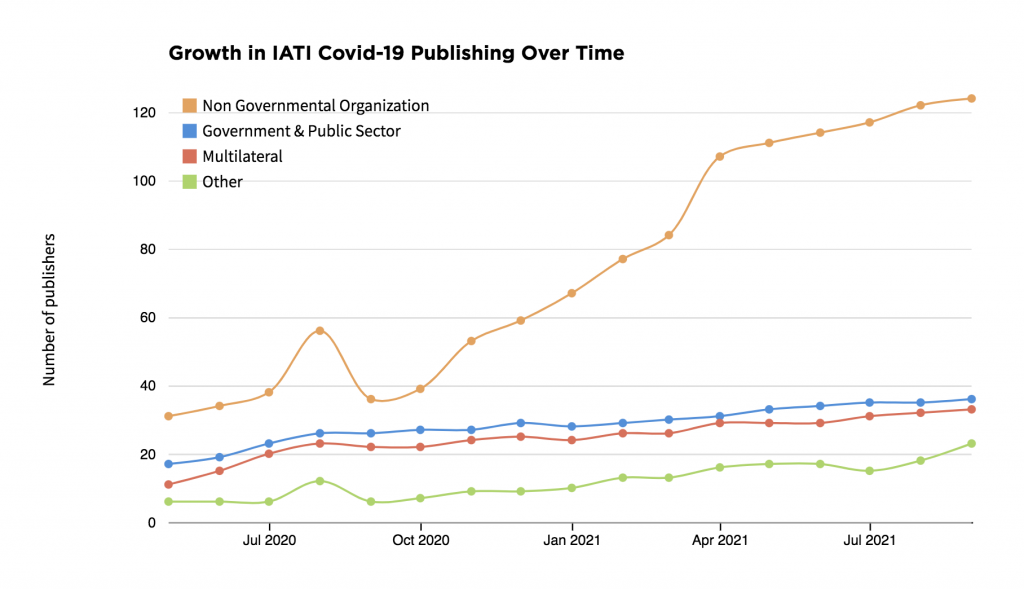Share
Since November 2020, the Centre has been investigating the usability and insight of COVID-19 funding data made available through the International Aid Transparency Initiative (IATI) standard. IATI is a global effort to improve the transparency of development and humanitarian financing focused on addressing poverty and crises. As of September 2021, over 200 organizations have published their COVID-19 funding data using the standard.
The Centre has explored this data to understand the financial commitments and spending related to the pandemic. We conducted research with IATI stakeholders and publishers to better understand their needs and capabilities. And we developed and documented algorithms to deduplicate and aggregate IATI data into meaningful figures.
We create an IATI COVID-19 Funding Dashboard (updated nightly) with financial transactions from over 13,800 reported aid activities covering $134 billion in commitments and $86 billion in spending directed towards 200 recipient countries and territories.

To reach a broader audience, we also created a data story that provides a curated view of the major insights from COVID-19 data over a fixed period (from January to September 2021). This includes interactive data visualizations showing, e.g., how quickly IATI publishers began sharing COVID-19-related data, the uneven distribution of gaps between money committed and money spent for different countries, and the major sectors targeted with COVID-19-related funding.

Our experience has given us a strong appreciation of the value of the IATI standard and its community of publishers. We have also seen where IATI falls short by making data use unnecessarily difficult and time consuming, and missing opportunities to make international aid more transparent.
We have identified four high-level issues from using the IATI COVID-19 data:
- Barriers to data use: Those who use IATI data, as we attempted to, will always try to do so across a range of publishers. There is too much complexity and too many inconsistencies in IATI publishing for this to scale.
- No feedback loops: IATI data users are left to resolve familiar problems time and again, with little chance to engage with publishers. The process for improving the IATI standard is unclear and slow.
- Individual focus: IATI publishers focus on their own data which is then expressed in different approaches and uses of the IATI standard. There is little dialogue between and among organizations to use and improve each other’s data. Pockets of collaboration do exist, but have been overshadowed by IATI being centered on compliance.
- The IATI standard is both too rigid and too flexible: All IATI publishers have to put their data into an activity which may not translate to the reality of their operations. In working with the IATI data, we had to bypass activities to get to the financial flows. At the same time, it is often not possible to trace funding between organizations because publishers don’t identify counterparties.
We recommend three high-level actions to improve IATI:
- The governance of IATI needs to be more open to feedback from data users. The IATI Institutional Review, which is currently taking place, should consider ideas around user-led governance and feedback.
- IATI guidance should be updated more often and include examples of best practice and good use rather than just instructions or definitions.
- Rankings and indices for IATI publishers should include performance metrics on collective and systematic data use in addition to focusing on the data quality of individual publishers.
Our report — IATI COVID-19 Data: Insights, Issues and Recommendations for Improvement — proposes changes that would be most beneficial and offers suggestions for how the IATI community might implement them. It should be noted that many of our findings and recommendations are already covered in the IATI Strategic Plan 2020-2025 including a focus on data quality and data use.
The Centre looks forward to collaborating with the IATI community to make improvements to the standard and related guidance so that valuable insights about aid activities are easier to generate and enable quicker decisions.
The work covered in this project was funded by the United States Agency for International Development (USAID). We are grateful for the considerable contribution of USAID colleagues in reviewing and providing feedback on our work. We would also like to acknowledge the earlier effort to create a prototype visualization to track the COVID-19 response by Development Initiatives which was undertaken on behalf of the Grand Bargain Transparency Workstream.
Please share comments or feedback at centrehumdata@un.org.